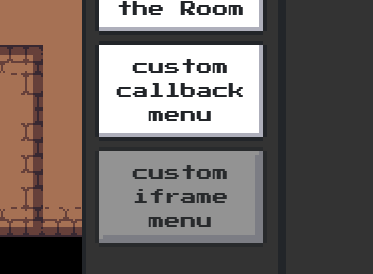* Implement UI Website system * Add UIWebsite documentation * Implement review fixes * Add getAll function on UIWebsite Co-authored-by: Alexis Faizeau <a.faizeau@workadventu.re>
8.5 KiB
{.section-title.accent.text-primary}
API UI functions Reference
Opening a popup
In order to open a popup window, you must first define the position of the popup on your map.
You can position this popup by using a "rectangle" object in Tiled that you will place on an "object" layer.
WA.ui.openPopup(targetObject: string, message: string, buttons: ButtonDescriptor[]): Popup
- targetObject: the name of the rectangle object defined in Tiled.
- message: the message to display in the popup.
- buttons: an array of action buttons defined underneath the popup.
Action buttons are ButtonDescriptor objects containing these properties.
- label (string): The label of the button.
- className (string): The visual type of the button. Can be one of "normal", "primary", "success", "warning", "error", "disabled".
- callback ((popup: Popup)=>void): Callback called when the button is pressed.
Please note that openPopup returns an object of the Popup class. Also, the callback called when a button is clicked is passed a Popup object.
The Popup class that represents an open popup contains a single method: close(). This will obviously close the popup when called.
class Popup {
/**
* Closes the popup
*/
close() {};
}
Example:
let helloWorldPopup;
// Open the popup when we enter a given zone
helloWorldPopup = WA.room.onEnterLayer("myZone").subscribe(() => {
WA.ui.openPopup("popupRectangle", 'Hello world!', [{
label: "Close",
className: "primary",
callback: (popup) => {
// Close the popup when the "Close" button is pressed.
popup.close();
}
}]);
});
// Close the popup when we leave the zone.
WA.room.onLeaveLayer("myZone").subscribe(() => {
helloWorldPopup.close();
})
Add custom menu
WA.ui.registerMenuCommand(commandDescriptor: string, options: MenuOptions): Menu
Add a custom menu item containing the text commandDescriptor in the navbar of the menu.
options attribute accepts an object with three properties :
callback : (commandDescriptor: string) => void: A click on the custom menu will trigger thecallback.iframe: string: A click on the custom menu will open theiframeinside the menu.allowApi?: boolean: Allow the iframe of the custom menu to use the Scripting API.
Important : options accepts only callback or iframe not both.
Custom menu exist only until the map is unloaded, or you leave the iframe zone of the script.
Example:
const menu = WA.ui.registerMenuCommand('menu test',
{
callback: () => {
WA.chat.sendChatMessage('test');
}
})
// Some time later, if you want to remove the menu:
menu.remove();
Please note that registerMenuCommand returns an object of the Menu class.
The Menu class contains a single method: remove(): void. This will obviously remove the menu when called.
class Menu {
/**
* Remove the menu
*/
remove() {};
}
Awaiting User Confirmation (with space bar)
WA.ui.displayActionMessage({
message: string,
callback: () => void,
type?: "message"|"warning",
}): ActionMessage
Displays a message at the bottom of the screen (that will disappear when space bar is pressed).
Example:
const triggerMessage = WA.ui.displayActionMessage({
message: "press 'space' to confirm",
callback: () => {
WA.chat.sendChatMessage("confirmed", "trigger message logic")
}
});
setTimeout(() => {
// later
triggerMessage.remove();
}, 1000)
Please note that displayActionMessage returns an object of the ActionMessage class.
The ActionMessage class contains a single method: remove(): Promise<void>. This will obviously remove the message when called.
class ActionMessage {
/**
* Hides the message
*/
remove() {};
}
Adding custom ActionsMenu Action
When clicking on other player's WOKA, the contextual menu (we call it ActionsMenu) is displayed with some default Actions. It is possible to add custom actions right when player is clicked:
To do that, we need to listen for the onRemotePlayerClicked stream and make use of the remotePlayer object that is passed by as a payload.
WA.ui.onRemotePlayerClicked.subscribe((remotePlayer) => {
remotePlayer.addAction('Ask to tell a joke', () => {
console.log('I am NOT telling you a joke!');
});
}
remotePlayer.addAction(actionName, callback) returns an Action object, which can remove itself from ActionsMenu:
const action = remotePlayer.addAction('This will disappear!', () => {
console.log('You managed to click me!');
});
setTimeout(
() => {
action.remove();
},
1000,
);
Open fixed iframes
You can use the scripting API to display an iframe (so any HTML element) above the game. The iframe is positionned relative to the browser window (so unlike embedded websites, the position of the iframe does not move when someone walks on the map).
This functonnality creates an iframe positionned on the viewport.
Display a UI website
WA.ui.website.open(website: CreateUIWebsiteEvent): Promise<UIWebsite>
interface CreateUIWebsiteEvent {
url: string, // Website URL
visible?: boolean, // The website is visible or not
allowApi?: boolean, // Allow scripting API on the website
allowPolicy?: string, // The list of feature policies allowed
position: {
vertical: "top"|"middle"|"bottom",,
horizontal: "left","middle","right",
},
size: { // Size on the UI (available units: px|em|%|cm|in|pc|pt|mm|ex|vw|vh|rem and others values auto|inherit)
height: string,
width: string,
},
margin?: { // Website margin (available units: px|em|%|cm|in|pc|pt|mm|ex|vw|vh|rem and others values auto|inherit)
top?: string,
bottom?: string,
left?: string,
right?: string,
},
}
interface UIWebsite {
readonly id: string, // Unique ID
url: string, // Website URL
visible: boolean, // The website is visible or not
readonly allowApi: boolean, // Allow scripting API on the website
readonly allowPolicy: string, // The list of feature policies allowed
position: {
vertical: string, // Vertical position (top, middle, bottom)
horizontal: string, // Horizontal position (left, middle, right)
},
size: { // Size on the UI (available units: px|em|%|cm|in|pc|pt|mm|ex|vw|vh|rem and others values auto|inherit)
height: string,
width: string,
},
margin?: { // Website margin (available units: px|em|%|cm|in|pc|pt|mm|ex|vw|vh|rem and others values auto|inherit)
top?: string,
bottom?: string,
left?: string,
right?: string,
},
close(): Promise<void>, // Close the current website instance
}
You can open a website with the WA.ui.website.open() method. It returns an Promise<UIWebsite> instance.
const myWebsite = await WA.ui.website.open({
url: "https://wikipedia.org",
position: {
vertical: "middle",
horizontal: "middle",
},
size: {
height: "50vh",
width: "50vw",
},
});
myWebsite.position.vertical = "top";
Close a UI website
You can close a website with the close function on the UIWebsite object
myWebsite.close();
Get all UI websites
You can get all websites with the WA.ui.website.getAll() method. It returns an Promise<UIWebsite[]> instance.
WA.ui.website.getAll();






